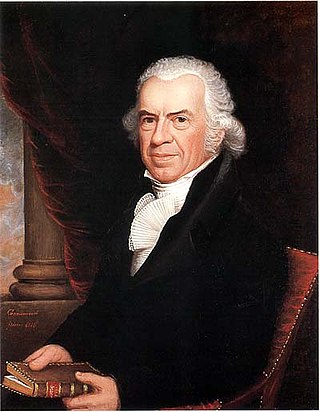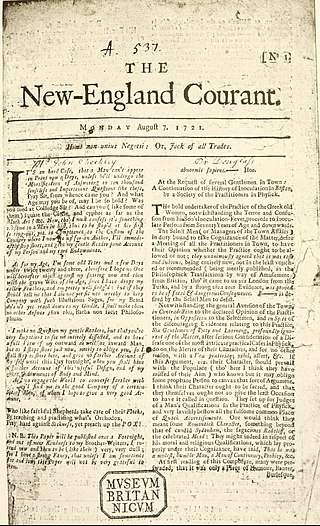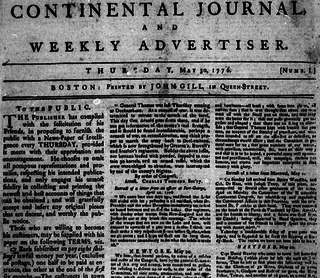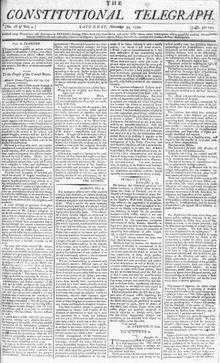
Levi Lincoln Sr. was an American revolutionary, lawyer, and statesman from Massachusetts. A Democratic-Republican, he most notably served as Thomas Jefferson's first attorney general, and played a significant role in the events that led to the celebrated Marbury v. Madison court case. He served two terms as Lieutenant Governor of Massachusetts, acting as governor for the remainder of Governor James Sullivan's term after his death in December 1808. Lincoln was unsuccessful in his bid to be elected governor in his own right in 1809.

Samuel Dexter was an early American statesman who served both in Congress and in the Presidential Cabinets of John Adams and Thomas Jefferson. A native of Boston, Massachusetts, Dexter was an 1781 graduate of Harvard College. After receiving his degree he studied law, attained admission to the bar in 1784, and began to practice in Lunenburg, Massachusetts.

Isaiah Thomas was an early American printer, newspaper publisher and author. He performed the first public reading of the Declaration of Independence in Worcester, Massachusetts, and reported the first account of the Battles of Lexington and Concord. He was the founder of the American Antiquarian Society.

Moses Gill was an American merchant and politician who served as the acting governor of Massachusetts from 1799 to 1800, when he died in office, the only acting governor to do so. A successful businessman, he became one of the most prominent colonists in Princeton, Massachusetts, entering politics shortly before the American Revolutionary War. He served on the Massachusetts Provincial Congress's executive committee until the state adopted its constitution in 1780, after which he continued to serve on the state's Governor's Council.

The Boston Gazette (1719–1798) was a newspaper published in Boston, in the British North American colonies. It was a weekly newspaper established by William Brooker, who was just appointed Postmaster of Boston, with its first issue released on December 21, 1719. The Boston Gazette is widely considered the most influential newspaper in early American history, especially in the years leading up to and into the American Revolution. In 1741 the Boston Gazette incorporated the New-England Weekly Journal, founded by Samuel Kneeland, and became the Boston-Gazette, or New-England Weekly Journal. Contributors included: Samuel Adams, Paul Revere, Phyllis Wheatley.

The Massachusetts Spy, later subtitled the Worcester Gazette, (est.1770) was a newspaper published by Isaiah Thomas in Boston and in Worcester, Massachusetts, in the 18th century.
John Fenno was a Federalist Party editor among early American publishers and major figure in the history of American newspapers. His Gazette of the United States played a major role in shaping the beginnings of party politics in the United States in the 1790s.

Benjamin Russell was an American journalist, born in Boston. He established the Columbian Centinel and was one of the founding members of the American Antiquarian Society.

The Worcester Spy, originally known as the Massachusetts Spy was a newspaper founded in 1770 in Boston, Massachusetts by Isaiah Thomas, dedicated to supporting the Revolutionary cause against the British. In the 19th century, it became an organ for abolitionist sentiment.

The New-England Courant, one of the first American newspapers, was founded in Boston in 1721, by James Franklin. It was a weekly newspaper and the third to appear in Boston. Unlike other newspapers, it offered a more critical account about the British colonial government and other royal figures of authority. The newspaper published critical commentary about smallpox inoculation which fueled the controversy during the smallpox epidemic in Boston. Ultimately it was suppressed in 1726 by British colonial authorities for printing what they considered seditious articles. Franklin took on his brother, Benjamin Franklin, as an apprentice and at one point was compelled to sign over publication of the Courant to him to avert further prosecution. Benjamin submitted anonymous editorials to the Courant, which resulted in James' imprisonment after he began publishing them.This sort of Governmental censorship of early colonial newspapers is what largely fostered the American ideal of Freedom of Speech in the press. The New England Courant is widely noted among historians as being the first newspaper to publish Benjamin's writings.

TheNewport Mercury, was an early American colonial newspaper founded in 1758 by Ann Smith Franklin (1696–1763), and her son, James Franklin (1730–1762), the nephew of Benjamin Franklin. The newspaper was printed on a printing press imported by Franklin's father, James Franklin (1697–1735), in 1717 from London. The Mercury may be the first newspaper published by a woman in the colonial United States. The Mercury was the also first paper to publish poetry by an African American woman, Phillis Wheatley.
The Columbian Centinel (1790–1840) was a Boston, Massachusetts, newspaper established by Benjamin Russell. It continued its predecessor, the Massachusetts Centinel and the Republican Journal, which Russell and partner William Warden had first issued on March 24, 1784. The paper was "the most influential and enterprising paper in Massachusetts after the Revolution." In the Federalist Era it was aligned with Federalist sentiment. Until c. 1800 its circulation was the largest in Boston, and its closest competitor was the anti-Federalist Independent Chronicle.

Anthony Haswell was an English immigrant to New England, where he became a newspaper, almanac, and book publisher, the Postmaster General of Vermont and one of the Jeffersonian printers imprisoned under the Sedition Act of 1798.

John Gill (1732–1785) was a printer in Boston, Massachusetts, in the 18th century. With Benjamin Edes, he issued the Boston Gazette newspaper. He later published the Continental Journal between 1776 and 1785.

The Salem Register was a newspaper published in Salem, Massachusetts, in the 19th century. William Carlton established it in 1800; subsequent publishers included his wife Elizabeth Carlton, John Chapman, Charles W. Palfray, Warick Palfray Jr., Haven Poole, Eben N. Walton. Among the contributing writers: William Bentley, Andrew Dunlap, Joseph E. Sprague, Joseph Story. Its office was at no.185 Essex Street.
The 88th Massachusetts General Court, consisting of the Massachusetts Senate and the Massachusetts House of Representatives, met in 1867 during the governorship of Republican Alexander Bullock. Joseph Adams Pond served as president of the Senate and James M. Stone served as speaker of the House.

Early American publishers and printers played a central role in the social, religious, political and commercial development of the Thirteen Colonies in British America prior to and during the American Revolution and the ensuing American Revolutionary War that established American independence.

Bibliography of early American publishers and printers is a selection of books, journals and other publications devoted to these topics covering their careers and other activities before, during and just after the American Revolution. Various works that are not primarily devoted to those topics, but whose content devotes itself to them in significant measure, are sometimes included here also. Works about Benjamin Franklin, a famous printer and publisher, among other things, are too numerous to list in this bibliography, can be found at Bibliography of Benjamin Franklin, and are generally not included here unless they are greatly devoted to Franklin's printing career. Single accounts of printers and publishers that occur in encyclopedia articles are neither included here.
















